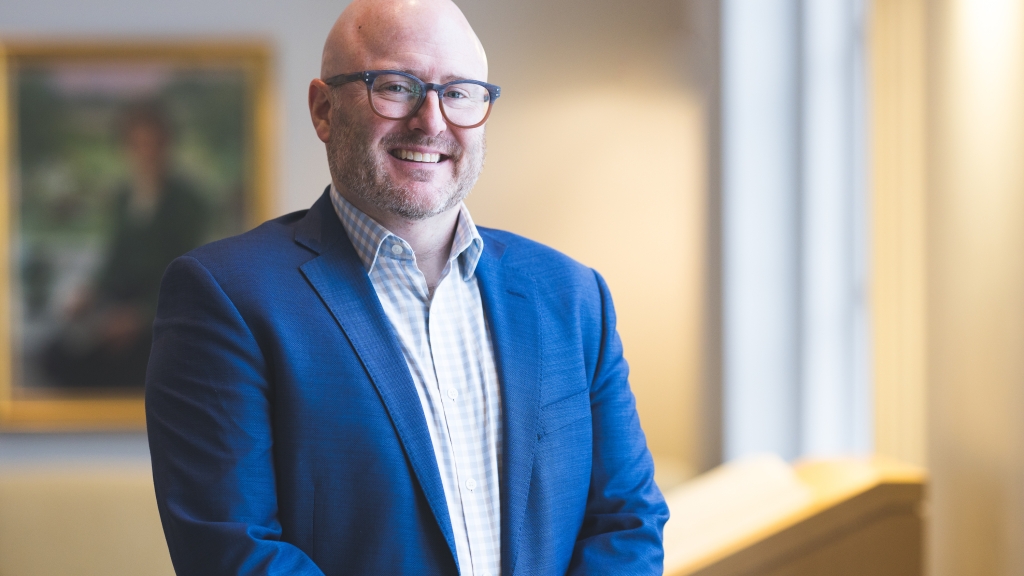Joseph Catrino joined the Dartmouth community this week as the inaugural executive director of the Center for Career Design, President Sian Leah Beilock announced today.
The appointment is the latest development in the ongoing reimagining of Dartmouth's undergraduate career services program—part of the commitment President Beilock made at her inauguration to invest in the lifelong value of Dartmouth by expanding professional advising for undergraduates and alumni throughout their careers.
"To help students thrive upon graduation and for a long and meaningful career thereafter, Dartmouth must support opportunities for them to identify career paths that align with their values, strengths, and aspirations," President Beilock says. "In Joe Catrino, we have found a proven leader who brings a design-thinking approach to career and life planning. I'm delighted to welcome him to Hanover."
Catrino has been hired to lead the Center for Career Design, which will incorporate and expand the Center for Professional Development into a best-of-its-kind resource for students to chart their future beyond Dartmouth.
"Joe brings a student-centered approach to career design that will empower undergraduates to identify and explore their interests as they begin to navigate their path beyond Dartmouth," says Co-Interim Dean of the College Anne Hudak.
Catrino was most recently the founding executive director of career and life design at Trinity College in Hartford, Conn., which strengthened the college's career development, student success, and retention services through a unified framework.
"Career design is about helping individuals navigate their professional journeys, applying the mindset of a designer to proactively shape a life of meaning and purpose," Catrino says. "It's a multidisciplinary, human-centered approach that is really about understanding people. The first step is empathy—helping students understand who they are, so they can make informed decisions."
The career-design approach is especially important for students at a time when technology and demographics are changing the expectations of the workplace, Catrino says.
"For the first time in history, we have five generations in the workforce—people in their 70s working with people just starting at 22," he says. "We need to help students to be nimble across different industries, to be able to articulate their skills, and to understand how they can partner with AI to leverage the future of work."
Key to shaping the center's vision will be collaboration with partners from across campus and in the alumni community.
"I intend in my first few months to do a lot of listening," Catrino says. "I'm interested in all perspectives. I want to meet with faculty, students, staff, and alumni and hear where there's overlap, how we can partner, where there are potential challenges. Design thinking is about creative problem solving."
A short-term alumni "fit-for-purpose" committee chaired by Mike Triplett '96 will serve as advisers to Catrino during his first year and help to organize alumni channels for feedback and participation in the center.
In advance of the center's launch, in September Dartmouth opened a new, centrally located satellite undergraduate career center in McNutt Hall and announced an anonymous $15 million, dollar-for-dollar challenge gift to help raise an additional $15 million—for a total of $30 million—to support a top-tier internship program.
The aim is to make internships accessible to all undergraduates, and for the new Center for Career Design to create a streamlined process through which students discover internship funding opportunities across the many campus programs that also facilitate them.
To date, the Dartmouth community of parents, alumni, and friends has raised $5.8 million toward the challenge goal.
Hudak says the response from the alumni community has been overwhelmingly positive.
"From the moment we announced the fundraising challenge, alumni and families have stepped up to support the idea that internships in all fields—including those that don't traditionally pay for internships or housing—should be within financial reach of all Dartmouth undergraduates," she says.
Maia Josebachvili '05, a member of the Board of Trustees, served on the search committee that hired Catrino.
"Dartmouth has long shaped the next generation of leaders, and a best-in-class Center for Career Design is key to advancing that mission," says Josebachvili. "Alumni are eager to support Joe in elevating our work here."
Catrino served a number of roles at Trinity before taking on the leadership of its Career and Life Design Center, including as senior associate director of marketing in the Office of Enrollment and Student Success, director of career development, and special assistant to the vice president for innovation.
Previously, he was associate dean of career development at Quinnipiac University's School of Communications and associate director of admissions and marketing for Quinnipiac University Online. He has served as adjunct faculty at Quinnipiac and the University of Hartford, and serves as a course development consultant for Texas A&M's College of Innovation and Design and as a studio facilitator for Stanford University's d.school.
Catrino earned his bachelor's degree in history with a minor in communications and public relations from Marist College, and went on to complete a master's in communication from the University of Hartford and an MBA from Quinnipiac University. He is currently working toward a doctorate in instructional systems and workforce development from Mississippi State University.
